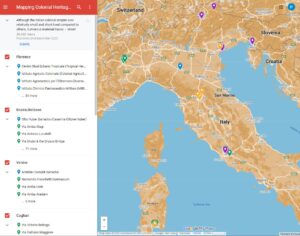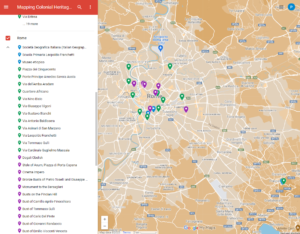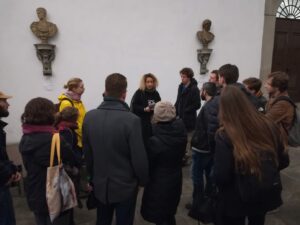Markus Wurzer
Even though Italian colonialism was a relatively short affair, this past heavily marked Italian cities. Indeed, colonial culture has left many legacies – street names, plaques, monuments, museum collections, etc. – that have remained visible in public spaces until today. In the decades after 1945, there was little engagement with such traces. Now, more than seventy-five years after the end of Italy’s colonial rule, colonial traces are ubiquitous in Italian cities and villages, but their significance is in most cases overlooked by inhabitants and visitors. Over the past few years, the Italian colonial past has started to be more widely discussed, and its legacies have become the subject of public debate.
Against this background, in 2018, in Florence, we (Daphné Budasz and Markus Wurzer), founded a public history initiative entitled Postcolonial Italy: Mapping Colonial Heritage. From its very beginning, the project has been designed as an independent, bottom-up initiative which aims to (a) identify and collect colonial traces, (b) provide critical knowledge on these traces in order to (c) trigger debate on colonial legacies and reflect on the social, political, and cultural consequences of colonialism within Italy’s contemporary society. For the purpose of dissemination and accessibility, in 2019 we created the website Postcolonial Italy, which presents an interactive map that provides information about geographical sites related to colonialism.
What started as a locally-grounded public history project about colonial traces in Florence has over the past three years evolved into an Italy-wide participatory and collaborative venture. We were able to enlarge the map by inviting scholars working on colonial legacies in other Italian cities to share their knowledge. Besides Florence, colonial legacies are now also marked and recontextualised in Venice (Elena Cadamuro and Marco Donadon), Rome (Serena Alessi, Carmen Belmonte, Eleonora Sartoni, and Nikolaos Mavropoulos), Cagliari (Valeria Deplano and Alessandro Pes), Bolzano (Sebastian De Pretto), Milan (Elisabetta Pauletti), Trieste (Iris Pupella-Nogués), and Parma (Sofia Bacchini).
In order to reach our main target audience, that is the Italian-speaking non-academic community, we created an audio guide for Florence in English and Italian on the occasion of Black History Month (BHM) 2021. More immersive than the website, this free digital tool enables users to delve deeper into the stories in the urban space and leads them on an unconventional city tour, which aims to trigger an alternative perception of Florence and its identity. During the BHM, we advertised the audio guide at its stops in the public space with small information panels. Beyond that period, the audio guide remains available for download via the storytelling platform izi.Travel. On the occasion of BHM 2022, we were able to launch the Italian version of the website, including a translation of the interactive map, thanks to the incredible help of our contributors and volunteer language editors (Devorah Block, Serena Calaresu, Moritz Deininger, and Livia Dubon).
Since the project’s main aim is not only to collect knowledge about Italy’s colonial heritage, but also to make it as easily and widely available to the public as possible, EDI issues are evidently at its core. We hope that Postcolonial Italy will thus contribute towards a collaborative future offering more diversity and equality for everyone.
Website Postcolonial Italy
Audio guide Uncovering Italian Colonial Pasts: Florence

Fig. 1: Postcolonial Italy collects knowledge about colonial legacies in cities all over Italy (Map data © 2022 Google).

Fig. 2: Colonial traces in Rome. Detail from the project’s online map (Map data © 2022 Google).

Fig. 3: Memory walk ‘Uncovering Italian Colonial Past’ in Florence, organised by Daphné Budasz and Markus Wurzer in December 2018.
